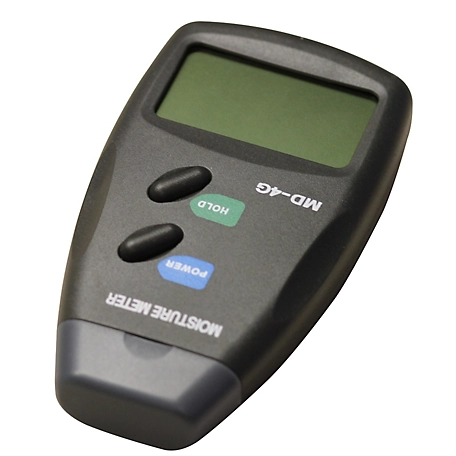Why Every Home Owner Requirements a Moisture Meter: Key Benefits and Attributes
Why Every Home Owner Requirements a Moisture Meter: Key Benefits and Attributes
Blog Article
The Ultimate Overview to Moisture Meters: A Comprehensive Summary and Just How They Can Conserve You Money
Moisture meters serve as indispensable tools in detecting and checking moisture material in materials, assisting in protecting against pricey problems and guaranteeing the high quality of items. Recognizing the nuances of different kinds of dampness meters, their applications, and the possible cost-saving benefits they supply can be a game-changer for organizations and professionals alike.
Kinds Of Wetness Meters
One typical type is the pin-type dampness meter, which gauges the electric resistance in between 2 pins put right into a product. Pinless wetness meters, on the various other hand, usage electromagnetic sensor plates to scan a bigger location without creating damages to the material's surface.

In addition, there are additionally specialty moisture meters developed for certain materials like hay, dirt, or grain. These meters give exact dampness readings tailored to the special residential or commercial properties of the material being checked. Infrared wetness meters gauge the thermal buildings of a material to identify its moisture material non-invasively, making them useful for applications where pin or pinless meters may not be suitable. Recognizing the various sorts of moisture meters offered can aid markets pick one of the most suitable device for their certain wetness dimension demands.

Benefits of Using Dampness Meters
Dampness meters provide invaluable advantages in properly evaluating and keeping an eye on dampness levels in diverse products and settings (Moisture Meter). Among the main advantages of making use of moisture meters is the prevention of prospective damages caused by excess moisture. By finding and addressing high moisture degrees early, wetness meters aid to stop mold growth, rot, and structural damages in structures, conserving both money and time on repairs. Additionally, wetness meters aid in making sure the top quality of products throughout building and construction or manufacturing processes. By accurately measuring moisture content, these tools help preserve the stability of wood, drywall, concrete, and other materials, decreasing the danger of flaws or failings.
Additionally, making use of moisture meters can bring about enhanced energy performance. By recognizing locations with high dampness degrees, such as leaks or inadequate insulation, modifications can be made to improve energy preservation and reduce energy prices. In agricultural settings, moisture meters play a vital function in optimizing crop yields by enabling farmers to keep track of soil moisture levels and make notified irrigation choices. In general, the benefits of making use of dampness meters extend throughout different markets, offering economical services and promoting far better high quality control techniques.
How to Select the Right Dampness Meter
When selecting a wetness meter, it's crucial to guarantee that the meter is appropriate for the certain material you will be testing. Various materials have differing electrical properties that can affect dampness analyses, so selecting a meter created for your material is critical for accurate outcomes. By very carefully examining these variables, you can select a wetness meter that fulfills your demands and supplies precise moisture measurements for your tasks.
Proper Strategies for Dampness Meter Usage

Expense Savings Via Moisture Meter Applications
Exactly how can the tactical utilization of dampness meters lead to considerable cost financial savings throughout various sectors? In the agriculture industry, wetness meters help in figuring out the optimal time for collecting plants, preventing excess or over-drying wetness that can impact the last product's top quality.
In a similar way, in building, moisture meters aid stop costly problems by identifying wetness degrees in building products, such as wood or concrete, which can cause structural problems otherwise dealt with promptly. By determining trouble areas beforehand, specialists can take corrective procedures to stay clear of substantial repairs or replacements, inevitably saving time and cash.
Furthermore, in the food processing sector, moisture meters are necessary for monitoring item quality and making sure conformity with security laws. By accurately determining dampness content in food, manufacturers can stop putridity, preserve quality, and reduce waste, causing significant price savings. In general, the critical application of moisture meters is an important investment that can result in substantial cost Check This Out decreases and improved performance throughout various sectors.
Final Thought
In conclusion, wetness meters are useful devices for detecting and determining moisture levels in various materials. By making use of the ideal dampness meter and complying with appropriate methods, users can properly protect against costly damages triggered by excess dampness.
Moisture meters offer as vital tools in spotting and keeping track of moisture web content in products, assisting in stopping costly problems and making certain the top quality of items. Infrared moisture meters gauge the thermal residential properties of a product to determine its dampness material non-invasively, making them valuable for applications where pin or pinless meters may not be navigate to this website suitable.Moisture meters offer important benefits in accurately examining and keeping track of wetness degrees in varied materials and settings. In agricultural settings, wetness meters play a critical duty in maximizing crop yields by enabling farmers to monitor soil moisture levels and make informed watering decisions.In conclusion, moisture meters are important tools for discovering and determining dampness levels in numerous products.
Report this page